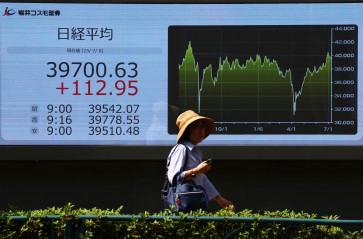Popular Reads
Top Results
Can't find what you're looking for?
View all search resultsPopular Reads
Top Results
Can't find what you're looking for?
View all search resultsAction urged to halt rupiah depreciation
The rupiah has depreciated by 1
Change text size
Gift Premium Articles
to Anyone
The rupiah has depreciated by 1.47 percent against the US dollar since the beginning of this year, making it one of the worst performing currencies in the region. It traded at around Rp 13,729 to Rp 13,771 per US dollar on Monday.
Over a one-month period, the rupiah has slumped 2.45 percent against the greenback as of Thursday, falling more steeply than its Asian peers, such as the Thai baht (0.8 percent), the Singapore dollar (1.37 percent) and the Korean won (1.28 percent).
The depreciation of the rupiah was mainly triggered by a statement by the new chairman of the United States Federal Reserve, Jerome Powell, who indicated the US central bank would increase its reference rate four times this year.
Powell reasoned that a more aggressive policy was needed in response to increasing inflation and the US government’s corporate tax rate cut to 25 percent from 31 percent.
Analysts predicted the rupiah would show heightened volatility until the Fed convened to decide on the interest rate. To anticipate further depreciation of the rupiah, Bank Indonesia (BI) needs to take immediate action.
Institute for Development of Economics and Finance (Indef) researcher Eko Listiyanto said the rupiah would continue to fluctuate, as the market was awaiting the upcoming Federal Open Market Committee (FOMC) meeting slated for March 20 and 21.
“BI needs to use the foreign exchange reserves at the right moment, not only to cushion the volatility of the rupiah, but also to prevent the rupiah from being undervalued for much longer,” he said.
BI sees the rupiah volatility as a temporary phenomenon, despite Powell’s indication of serial hikes in US interest rates this year.
Dody Budi Waluyo, BI’s assistant on economic and monetary policy, said BI had declared to keep the exchange rate stable below Rp 13,800 per US dollar.
“Based on our assessment, the rupiah fluctuations will be temporary,” he said.
Meanwhile, Coordinating Economic Minister Darmin Nasution said he hoped BI could stabilize the rupiah exchange rate, even though it would deplete the foreign currency reserves.
“[A forex reserves depletion] would happen, there is no free lunch, right?” Darmin said.
The country’s foreign exchange reserves jumped to US$131.9 billion as of late January, up from $130.2 billion a month earlier.
Finance Minister Sri Mulyani Indrawati acknowledged that companies in Indonesia had begun to seek US dollars to pay dividends and interest. “We have not yet seen a worrying reason to buy US dollars, and we deem the fundamentals still good,” she said.
Investment Coordinating Board (BKPM) head Thomas Lembong expressed a positive view, saying that as long as the rupiah movement remained relatively stable, the depreciation would boost investment in Indonesia.
Trade Minister Enggartiasto Lukita said the undervalued rupiah would benefit Indonesia rather than the US, because Indonesia could boost its exports.
“Moreover, higher inflation in the US would create a hurdle in the corporate sector, as the cost of funds and labor will increase, so we can ask the companies to manufacture in our country,” he said after a Cabinet meeting at the Presidential Palace in Jakarta.
However, he admitted that turning the card was not as easy as it seems, because the US had gradually closed its doors to imports with non-tariff measures.
During the Cabinet meeting, President Joko “Jokowi” Widodo did not discuss rupiah volatility but government efforts to open new export markets to anticipate protectionist moves from particular countries, while maintaining domestic price stability to keep inflation in check.
“Some export target countries have imposed protectionist policies, so we need to increase our export competitiveness and seek alternative markets for exports,” the President said.
In the short term, he said, price stability policies would focus on the price of rice, which rose in February. The government would interfere in the market by supplying 140,000 tons of subsidized rice every month until Idul Fitri in June.










